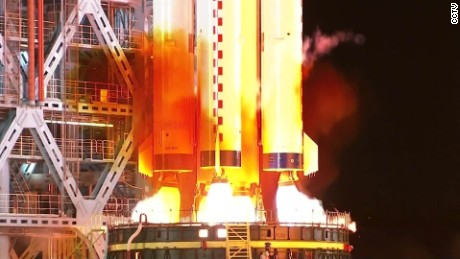UnNews:Local takeaway joins space race
| A newsstand that's brimming with issues | ✪ | UnNews | ✪ | Wednesday, February 18, 2026, 20:05:59 (UTC) |
| Local takeaway joins space race | 
|
16 September 2016
PRESTON, England -- Another young entrepreneur has joined the commercial spaceflight sector, hoping to bring the comforting experience of a lonely Saturday night in front of the telly to those in lower earth orbit. Mrs Wong, the CEO of Garden Dragon Takeaway on Plunginton Road here, aims to provide chips and curry sauce to fare-paying dot-com millionaires, geek test pilots and overachieving scientists — professionals known for solitude and a galactic lack of culinary skill.
The “Customer Module” of The Garden Dragon Takeaway was launched on a Long March 7 rocket from the Gobi Desert in Northern China Thursday night. The module included a preassembled counter — menus already open under a Perspex top — a glass-fronted fridge full of Tizer and a 12” Phillips portable cathode ray television from 1986 in the corner, to broadcast repeats of Takeshi’s Castle at full volume for customers.
Mrs Wong said: “The private sector has always been part of the space program, ever since companies like Lockheed, Sears Roebuck & Co., and Parker built the hardware to get men to the moon, write postcards, listen to the Rosemary Clooney Show and return, safely to earth. President George W. Bush took the small step of mandating publicly funded spacecraft instead of NASA, who are far too cautious and expensive when it comes to lighting the (decorative paper) lantern.”
More recently, President Obama took a giant retrograde leap for mankind, by telling NASA to stop playing with expensive spaceships and instead, focus on a much cheaper media campaign to make people think they were playing with expensive spaceships. The result is that the next American spacecraft to fly into orbit will be operated not by 23,000 highly qualified NASA boffins, but by a bored, gum-popping teenage coder who had been grounded for an extended period by his or her parents.
The next phase calls for the launch of the Shenzhou 11 next month with a hob, a wok, a chef with a huge cleaver and counter staff, to dock with the customer module. Their mission is to complete outfitting and formally open The Garden Dragon for business. Mrs Wong said that to drum up trade initially, every order over $15 will include a free box of prawn toast and free delivery within 21,600 miles.
China insists its space programme is for peaceful, culinary purposes, but the U.S. Department of Defense has highlighted its increasing space capabilities, saying it was stealing a march on adversaries intending to launch their own space-based chain restaurants and get a piece of the fortune-cookie action.
Mrs Wong disagrees: “The DOD has clearly never been out in Preston; it’s a shithole. Subway closed after the ninth robbery and KFC went bust when it found no niche beyond keeping the local smack-heads dry. Believe me, working in the harsh environment of space is a walk in the Van Halen Belt, compared to Friday night “fight club” in Preston. It is why I employ steely-eyed missile warriors from Chen village — devastating at Tai Chi, as well as being able to conclude in a timely manner, whether a “caution and warning” alarm is real, or just instrumentation.”
Mrs Wong plans to have a take-away on Mars by 2020, to recreate the success of the US Viking 1 mission that landed a Shake Shack on the planet four decades ago. China has been working to develop its space programme for military, commercial and scientific purposes, but was playing catch-up to established space powers like Russia, until they decided to ust buy the Soyuz technology off them, and the US, who have given up altogether and shifted to Outreach to Islam.
The only other country to become a space superpower is India, launching the Bengal Spice tandoori restaurant on top of their Chandrayaan-1 rocket, on 22 October 2008. The mission ended in tragedy, as a progressive leak of flammable hydrocarbon gas caused an explosion, destroying the spacecraft and killing the crew only nine hours after their first vindaloo and Kingfisher night, though its timing obviated the inevitable competition for the limited sanitary facilities on-board.
Sources[edit]
Katie Hunt and Deborah Bloom "China launches Tiangong-2 space lab". CNN, September 15, 2016
